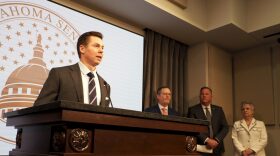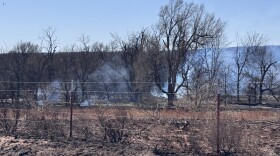After finishing up work at the airplane manufacturing plant where Robert Karr has worked for more than three decades, the McAlester city councilman drives his pickup truck around the town's 4th ward. Karr has lived in this area almost his entire life, save for six years when his family moved out of town.
His 4th ward roots are deep, and Karr knows his constituents well.
“This guy right here is pretty interesting,” Karr says as he drives past a one-story brick home. “He's got his Batmobile car back there, if you ever want to see a nice Batmobile car.”
A few blocks down the road, Karr stops short of a barbed wire fence in front of a massive white brick building. There’s a guard tower, and three men in orange jumpsuits are walking the grounds.
“This is the entry to the prison. When we was kids, we ran all over here. Used to fish on prison property and get run off,” he says.
The Oklahoma State Penitentiary sits in Karr’s ward. But it’s not the only prison here. The Jackie Brannon Correctional Center is another block away. And those prisoners — all 1,500 or so — are technically Karr’s constituents.
The U.S. Census Bureau counts prisoners at the location they're at on the day of the census, instead of at their home residence. That's different than the way college students or newborn babies are counted.
Karr gets a lot of grief from his fellow councilmen every time there's a disturbance behind the prison's walls.

“Boy, you better calm down your constituents over there. Come on, councilman, take care of that problem,” Karr says the councilmen joke.
An accidental adjustment
It wasn’t always this way. For most of McAlester’s history, the city excluded the prison population from its redistricting process. But when the city adopted a new charter in 2006, it accidentally undid that practice. And when the redistricting committee redrew the lines, Karr’s ward was cut in half.
“Of course I opposed it,” Karr says. “I said, ‘You know, surely this isn't right.’ But they said, ‘Well our charter was written. That's why it's going to have to be.’”
Instead of 3,000 constituents, Karr now represents around 1,300. His ward is less than half the size of others in the city, so his vote on the city council is actually more powerful.
It might not be such a big deal in local politics, but Karr worries about the implications on a larger scale.
“When you're more powerful than a local city like a state representative or something, or a United States representative, it really wouldn't be fair with somebody like that,” Karr says.
‘Fluff it up’
Prison gerrymandering, or drawing district lines with prisons inside so it benefits a particular party, is pretty common, according to the University of Oklahoma's Political Science chair Keith Gaddie. He argues it distorts the One Person, One Vote doctrine.
“This means that you need fewer actual voters in the district. And it also means that you can draw a district with relatively few voters in it but it meets the equal population criteria. But you've been able to fluff it up with a bunch of non-voters,” he says.
Prisoners count for nearly 10 percent of Oklahoma House District 59’s population in western Oklahoma, according to the Prison Policy Initiative. Most were counted at the federal prison in El Reno and a private prison in Watonga, which has since closed.
“If you count a few people in the wrong place, that's not ideal,” says Aleks Kajstura with the Prison Policy Initiative.
But as incarceration rates have grown, Kajstura says equal representation has become harder to maintain.
“Starting really with the 2000 census there's just been so many people incarcerated when that data is used for redistricting purposes, it really skews representation within a state and within counties and cities,” Kajstura says.
Without those prisoners in House District 59, the district would not meet federal minimum population requirements.
Redistricting woes
Kajstura says this practice also causes headaches because prisons can close at any time. The one in Watonga shut down just weeks after the 2010 census.
“That particular facility where you are in on Census Day isn't representative with where you eat and sleep most of the time,” Kajstura says.
Political science professor Keith Gaddie says the practice benefits rural areas. He’s unsure how intentional it is, but he says a Democratic representative did approach him in 2002 during that year’s reshuffling.
“He said, ‘Dr. Gaddie, you know a perfect Democratic district is like a nursing home or a junior college tacked on to a prison, that way you don't need a lot of actual voters,’” Gaddie recalls.
As for McAlester’s city troubles, citizens voted to amend the redistricting procedures to exclude the prisons. Robert Karr’s hopeful the new ward lines will mean someone new could run for his post in 2018. He works full time, has a couple grandkids and is ready for a break.
“Hopefully, if we redistrict before then there may be some people who want to run, and I'll contribute to their campaign,” Karr says.
As unfair as he says his pint-sized district is, Karr admits it’s worked to his advantage: he receives half as many phone calls as his city council colleagues.
KGOU produces journalism in the public interest, essential to an informed electorate. Help support informative, in-depth journalism with a donation online, or contact our Membership department.








